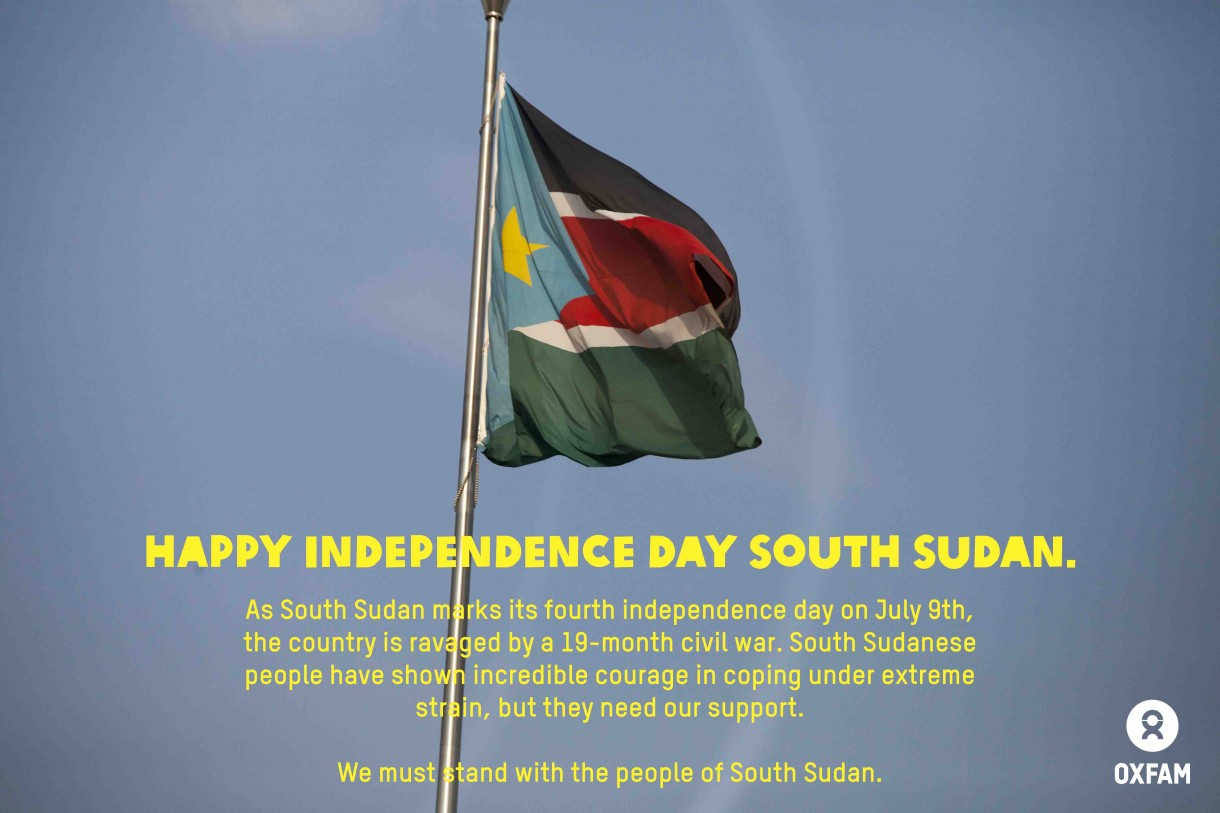For citizens of South Sudan, this year’s Independence Day is bittersweet
 Nyach and Nya, pictured in March 2014, were among the thousands of children and young South Sudanese displaced from their homes by conflict. "I hope it ends soon so I can go back to school," said Nyach. Photo: Mackenzie Knowles Coursin/Oxfam
Nyach and Nya, pictured in March 2014, were among the thousands of children and young South Sudanese displaced from their homes by conflict. "I hope it ends soon so I can go back to school," said Nyach. Photo: Mackenzie Knowles Coursin/Oxfam
If we really are independent, why are children going hungry and families driven from home? And what can we do to find solutions?
The young nation of South Sudan was born on July 9, 2011. After a nearly five-decade-long liberation war from Sudan, its citizens hoped for a true independence marked by peace, reconciliation, and development. But those dreams were shattered when, in December 2013, a feud among the political elite sunk the country back into war.
Today, more than 2 million people have been driven from their homes in search of safety. Almost 8 million South Sudanese are hungry. Food prices have skyrocketed and many people are struggling to cope with an ever-rising cost of living.
Below, Muzamil Chadi, who works with Oxfam in South Sudan, shares his perspective on this year’s Independence Day.
On the eve of independence, all of Juba was in a jubilant mood. The streets were jammed; people were dancing and singing—the air was filled with indescribable joy. Our time was finally here: the long awaited time for freedom, justice and protection had come. I remember people saying they had “finally escaped all the tyranny and mistreatment.”
My most memorable moment was when the South Sudanese flag was hoisted. With teary eyes, I remembered those I had read and heard about who fought for our liberation. It was all worth it now.
I felt this was the beginning of justice, freedom of speech and movement, development and growth of the country. Our voices as citizens would be heard. Mothers would not have to die while giving birth. Children would go to school and realize their dreams. South Sudan would take care of its citizens just like any other country does.
But the war broke out and things changed almost instantly. Tears and suffering and death had once again engulfed us. It felt like we had gone back on what we had fought so long and hard for.
I have so many questions. Was it really worth it? If we really are independent, why are children going hungry? Why are families forced to leave their own homes and live in countries that are not their own? Who is responsible for all this?

International governments, most of whom were the midwives in the birth of this country, have shown solidarity with the people of South Sudan. Just in June, they pledged $275 million to provide humanitarian assistance to those that need it the most. Even then, humanitarian agencies still need more to provide food, water, healthcare and protection for the millions affected by the crisis. I can’t help thinking that the world will lose patience with us, if the war continues.
When I look at my two daughters, I fear that they will not be able to enjoy the fruits of independence of their country. They are going to school and have dreams and desires for their future. But will they realize those dreams in their home country or will they opt to leave?
What about the 400,000 children who are currently out of school because of the war? What about the over 200,000 children who may not be able to see their fifth birthday because they lack food? What happens to the women, children and men living in constant fear and trauma from the violence they have witnessed?
For me, we will truly be independent when we as citizens of this country say enough is enough, and work together to come up with solutions to this problem. We can’t sit back and watch things happening. We need to join together and seek peace to give South Sudanese a country worth living in.
Above all, we must not lose hope—these tough times are passing clouds. Change will come.
Help Oxfam rush food and clean water to families in South Sudan that have fled their homes.